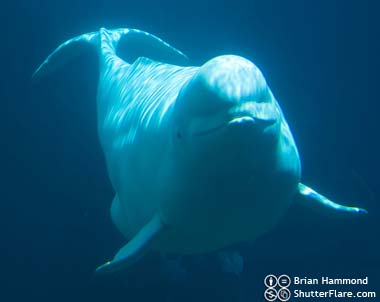Beluga whale at Mystic Aquarium in Connecticut; photo by Anne on Flickr (noncommercial use permitted with attribution / no derivative works).
Official State Marine Fossil of Vermont
Vermont designated the beluga whale skeleton at the Perkins Geology Museum (University of Vermont) as the official state fossil in 1993 (in 2014 the designation was amended to "State Marine Fossil" when the Mount Holly mammoth tooth and tusk were adopted as the official terrestrial fossil of Vermont). Vermont is the only state that designates a fossil symbol from a species that still exists today. All State Fossils
Today the beluga (or "white whale") is found only in the Arctic Ocean and adjoining seas, but the whale skeleton adopted as Vermont's state fossil (discovered near Charlotte, Vermont in 1849) lived about 12,500 years ago in the Pleistocene Epoch, when part of the Atlantic extended into Vermont and New York.
Beluga whales (Delphinapterus leucas) are white as adults They live in groups (called pods) of 2 to 25 individuals and sing so loudly to each other that they are sometimes called "sea canaries." During migration, pods join to form larger groups of 200 to 10,000 whales. Extremely social, beluga whales hunt together, chase each other (playfully or aggressively), and show affection by rubbing against each other.


